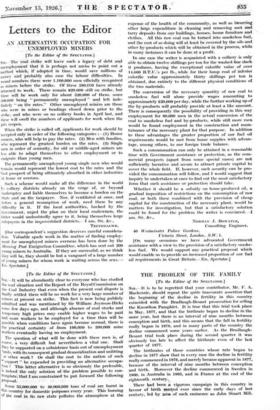[To the Editor of the SPECTATOR.] , SIR,—It will be
abundantly clear to everyone who has studied the coal situation and the Report of the Royal Commission on the Coal Industry that even when the present coal dispute is finally settled there will be no work for a very large number of' miners at present on strike. This fact is now being publicly admitted and was mentioned by Sir William Joynson-Hicks some few days ago, and although absence of coal stocks and temporary high prices may enable higher wages to be paid and more workers to be employed for a time than will be possible when conditions have again become normal, there is the practical certainty of . from 100,000 to 200,000 mine workers eventually having no employment. -
• The question of what will be done with these men is, of coupe, a very difficult but nevertheless a vital one. Shall they be supported on a subsistence basis out of unemployment '.ands, with its consequent gradual demoralization and unfitting ar other work ? Or shall the cost to the nation of such support " be expended in providing an alternative occupa- tion ? This latter alternative is so obviously the preferable, is indeed the only solution of. the problem possible to eon- template that I-am constrained-10 put. forward the following
Proposal. • Some 35,000,000 to 40,000,000 tons of coal are burnt in this country for dothestic ptirposei every year. This burning of the coal in its raw state pollutes the atmosphere at the expense. of the health of the community, as well as incurring other large expenditure in cleaning and removing soot and tarry deposits from our buildings, houses, house furniture and clothes. All. this raw coal can be turned into smokeless fuel, and the cost of so doing will at least be covered by the oils and other by-products which will be obtained in the process, while in many instances it can be done at a profit.
In one case the writer is acquainted with a colliery is only able to obtain twelve shillings per ton for the washed fine slack it produces, having the exceptional calorific value of over 14,000 B.T.U.'s per lb., while for their lump coal of inferior calorific value approximately thirty shillings per ton is obtained, due entirely to the different physical conditions of the two materials.
The conversion of the necessary quantity of raw coal to smokeless fuel will alone provide wages amounting to
approximately £20,000 per day, while the further working up of the by-products will probably provide at least a like amount. There is consequently the possibility of providing in this way employment for 80,000 men in the actual conversion of the coal to smokeless fuel and by-products, while still more men would be found employment in the construction and main- tainance of the necessary plant for that purpose. In addition to these advantages the greater proportion of our fuel oil requirements would be met from home supplies with advan- tage, among others, to our foreign trade balance.
Such a consummation can only be attained in a reasonable time with Government assistance or protection, as the com- mercial prospects (apart from some special cases) are not sufficiently lucrative and secure to attract private capital to cover the whole field. If, however, such security can be pro- vided the consummation will follow, and I would suggest that inquiry be undertaken at once to find out the most satisfactory form that such assistance or protection should take.
Whether it should be a subsidy on home-produced oil, a
gradual imposition of restrictions on the consumption of raw coal, or both these combined with the provision of cheap capital for the construction of the necessary plant, would be matters for investigation, but that a satisfactory solution could be found for the problem the writer is convinced.—I am, Sir, &c., NORMAN J. BOWATER, Consulting Engineer.
40 Westminster Palace Gardens, Victoria Street, London, S.W. 1.
[On many occasions we have advocated Government assistance with a view to the provision of a satisfactory smoke- less fuel. We would support any practical proposal which would enable us to provide an increased proportion of our fuel oil requirements in Great Britain.—En. Spectator.]














































 Previous page
Previous page